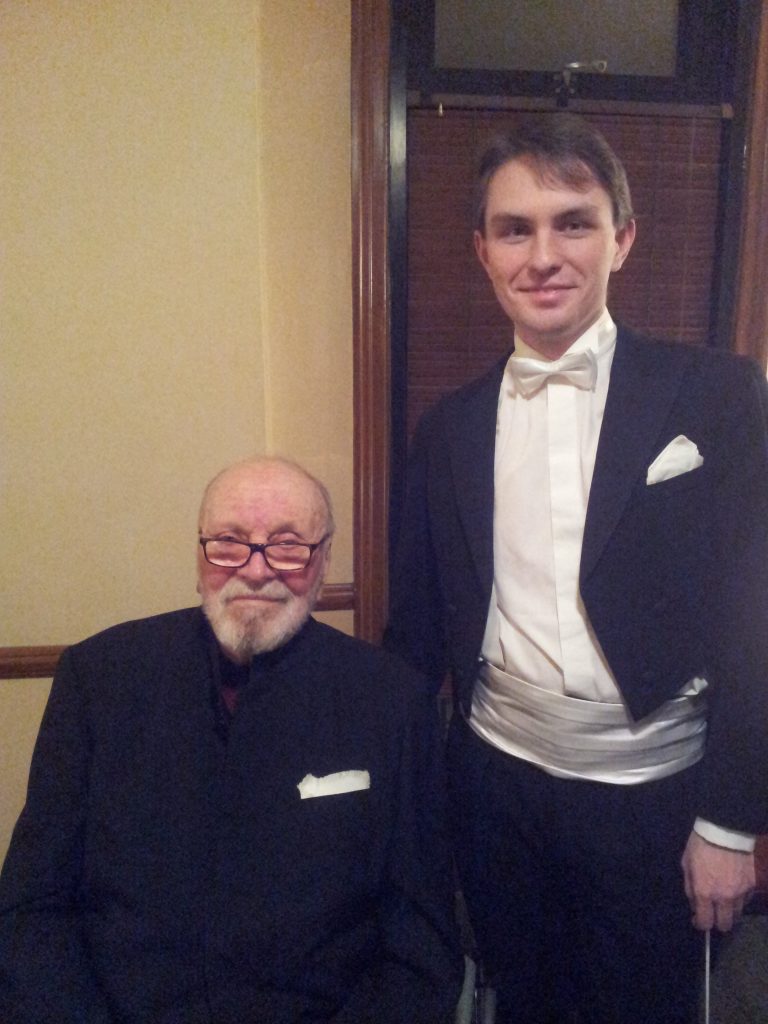OBITUARY: PROF. KURT MASUR

An article by Lukáš Pohůnek for slovak music magazine Hudobný život.
Original post is available at https://hc.sk/hudobny-zivot/clanok/hudobne-spravodajstvo/822-kurt-masur/
In January we bade farewell to the world-renowned German conductor and key political figure of the 20th century Professor Kurt Masur. He had long been a musical director and principal conductor with the New York Philharmonic, the Leipzig Gewandhausorchestra, the London Philharmonic and the Orchestre National de France. He was also honorary conductor of the Israel Philharmonic and an honorary citizen of the town of Leipzig. He died on 19 December 2015 in Greenwich, Connecticut, at the age of 88.
“A great spirit” – these words strike me as being one way of characterising this icon of 20th and 21st century German classical music. Kurt Masur, whom I had the opportunity to get to know towards the end of his life, was a figure of international artistic and musical significance and was also important on the political scene. During the revolutions of 1989, he averted the threat of civil war in Eastern Germany in his long-standing role as Gewandhauskapellmeister, and following reunification he was proposed as a candidate for federal president.
I remember our first meeting in January of last year in New York at a seminar for conductors he was running. It was immediately clear that this very friendly Silesian born in Brieg near Wroclaw would not only become my music mentor but also someone of much greater significance. After brief introductions, during which he reminisced joyously about collaborating with the Slovak and Czech Philharmonics and his many performances at the Prague Spring Festival we set about studying a works by Bruckner and Wagner with the MSM Symphony Orchestra in New York. It was fascinating! This philosopher and deeply spiritual thinking man inspired me from the first moment and led me to view and understand music, and even myself, in an entirely new way. His life motto was respect for people and the uniqueness of human existence. It was on this idea that his whole view of the world and music was based. Although he was already suffering from the advanced stages of Parkinson’s disease, he still had great energy for life. He even got up from his wheel chair and took the conductor’s stand and led me and the orchestra through his musical ideas. He was incredibly precise, hard-working and determined when working with the orchestra. I can’t recall a single moment when he let up on his artistic demands when appearing before the players. It was extremely interesting to hear his many amusing tales of life. His humour never left him, even in old age. These attitudes influenced all those who were present at his seminar which culminated a few days later in a concert we performed at the John C. Borden Auditorium in Manhattan. It was hard for me to say goodbye to a man who, from the very first moment, had been such a great inspiration to me… I wanted to spend more time with him, working on musical scores or just engaged in general conversation. I felt an increasingly strong desire to meet him again.
That desire was fulfilled a few months later when an invitation came from the Maestro to attend the summer school for conductors at the Mendelssohn-Akademie in Leipzig. We spent almost a month together studying the works of Mendelssohn, Beethoven, Bach and other German composers. His knowledge and direction in this area were truly unique. But no wonder – alongside his experiences performing German music, he also concentrated on musicology, actively supporting it throughout his life as president of Mendelssohn-Stiftung in Leipzig and as chair of Beethovenhaus in Bonne. In addition to the construction of the new Gewandhaus building in Leipzig, he was also behind the renovation of the birthplace of Felix Mendelssohn-Bartholdy and the memorial to him there. Part of the summer school for conductors was another concert performance with the Leipziger Sinfonieorchester in Leipzig and an excursion to the places mentioned above and many others in eastern and western Germany. On each trip it was clear from the beginning just what an important contribution to German music culture Kurt Masur had made. But it also explains why his recordings of German works are so highly valued and sought after.
When I look back over the last year spent with Maestro Masur, it’s increasingly clear to me just what an inspiration he became to me, both in my artistic life and in my ordinary life. My memories of him, his experiences and wisdoms of life, have become a firm basis for pursuing new challenges at work as well as in my personal life. The last year of his life, when I was able to accompany him and those close to him on his life’s journey, I will hold dear in my memories and in my heart…
© English translation by Inštitút jazykov a vzdelávania (http://www.ijav.sk/)